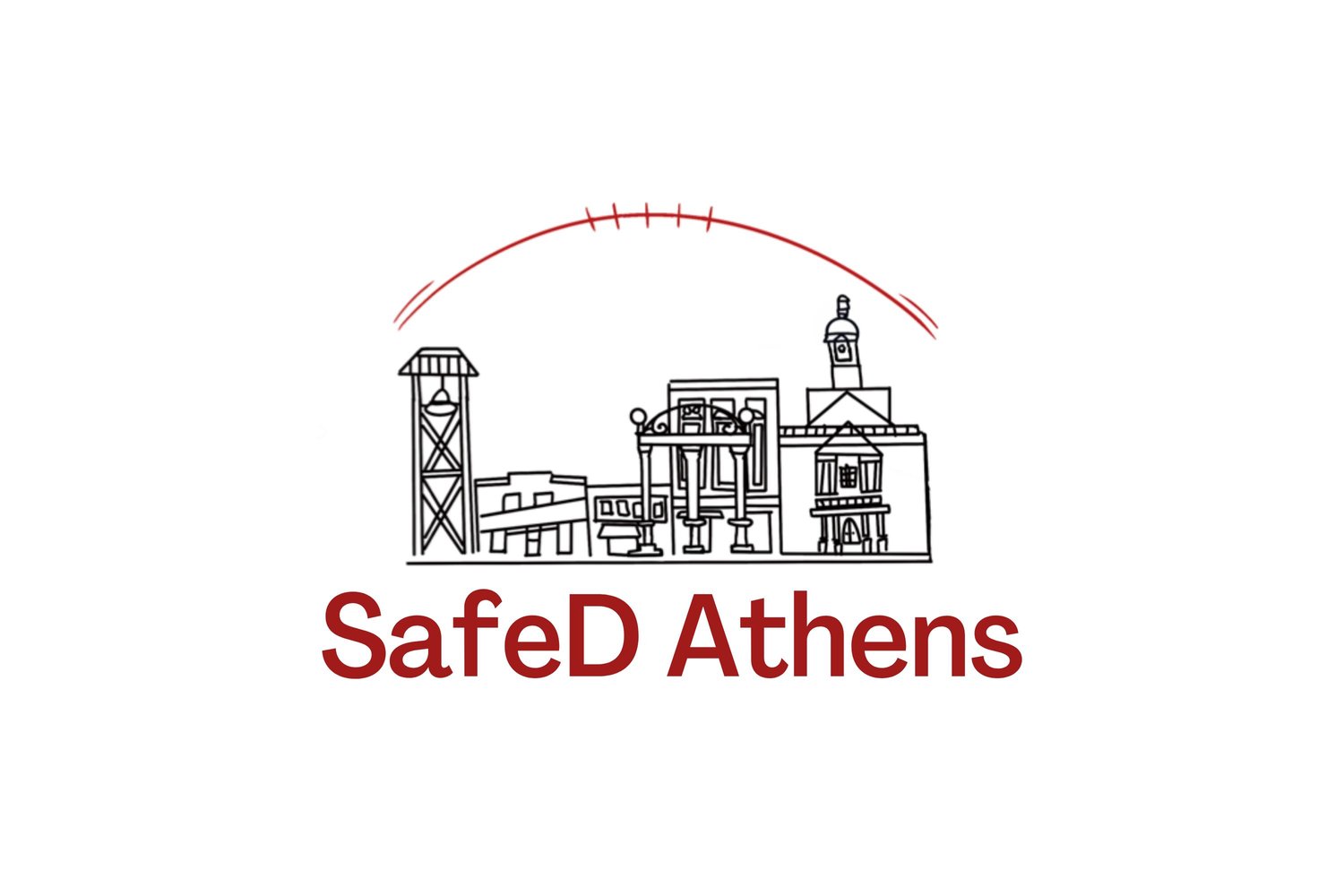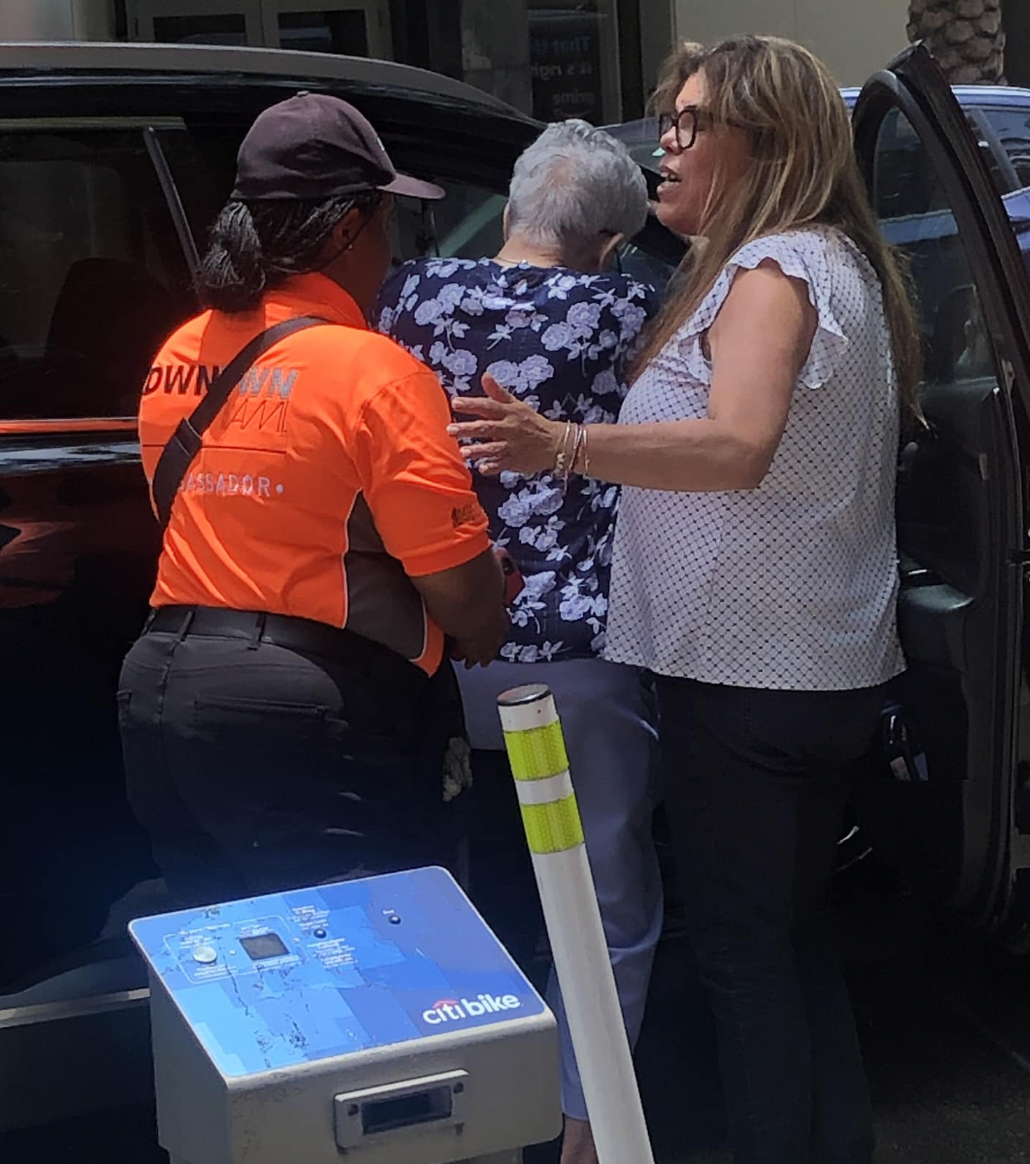Programs are ever-evolving but goals are always the same - A walkable, safe, secure, and clean environment to be enjoyed by everyone; to provide the ultimate town-and-gown experience. The strategy involves layering ‘security programming to mitigate risks’ and includes use of infrastructure, technology, ‘nontraditional’ efforts including ambassadors, environmental planning, and participation of property owners with city government.
What is a Safe Zone?
A Safe Zone is a special patrol district with prosecutorial powers to allow for stiffer penalties. Since UGA Police has existing jurisdiction within 500 yards of University property, a zone matching this 500 yard jurisdiction surrounding the main campus would be a start. Other zoning applications could be extended, to include distant student housing, or other UGA campuses. The University of Southern California has a highly effective Safe Zone, working with the specific District Attorney covering the area, with cooperation of the Los Angeles Police Department. Through successful implementation and reporting metrics, USC created a safer community leading to enhanced safety perception. USC learned that living within the Safe Zone became sought after by both students and residents over time. Thus, landlords and other property owners are supportive of the Safe Zone. For Description of USC Safe Zone programming and mapping Click Here, page 2, page 3.
Who are Ambassadors and what do they do?
Many times Ambassadors are your neighbors; many employed thru second-chance opportunities. Use of Ambassador Safety Patrols in university neighborhoods and downtowns within a Safe Zone is a nontraditional approach to enhanced security and has proved successful in many university settings including USC, OSU, UVA and now UT in Austin. Depending upon requirements, many times Safety Ambassadors hold state licensing. While on patrol, they assist with escorting residents, particularly at night and in downtown areas or to/from student housing. Outreach Ambassadors have specialized training to engage unsheltered homeless individuals. We benchmarked programming through Block by Block to include Outreach Ambassadors under the direction of Advantage Behavioral Health Outreach who currently has 2-4 outreach workers within the county. Use of Block by Block’s SMART System provides real-time reporting for homeless assessment purposes and keeps track of sub-zoning duties for all ambassadors working within dynamic zones. You can read our Block by Block Proposal Here.
Mapping of 70-80 unsheltered homeless individuals on major roads within the county (purple) using the Block by Block SMART System.
How can Landlords help reduce police calls?
The International Crime Free Multi-Housing Program consists of three phases which must be completed under the supervision of Athens-Clarke County Police Department. Property managers can become individually certified after completing training in each phase and the property becomes certified upon successful completion of all three phases. Benefits include reduced police calls for service, a safer plus more stable resident base, and reduced exposure to civil liability. The heart and soul of the program is in the correct implementation and use of the Crime Free Lease Addendum. Phase I - Management Training (8 hours thought by certified police) Phase II - CPTED (Crime Prevention Through Environmental Design) survey completed by ACCPD and Phase III - Community Awareness Training which includes at a minimum an annual crime prevention social taught by property management and police. Full certification permits display the CFMHP insignia and advertise membership to prospective tenants. Certification is renewed annually.
How does my freshman daughter get to and from her Science Lab late at night?
A more robust Safe Ride Program to improve flexible transit options in a tiered way is needed. UGA buses on campus only provide options from a handful of selected stops on campus, the existing Lyft discount option. provides only a $30 per month subsidy. Safer transportation can be in conjunction with organized off-campus student housing, university transit, and the Athens-Clarke County “on-call” transit program. There are many ways to integrate transit opportunities. Currently, the Lyft program only allows for 4 discounted rides per month per student with a maximum discount of $7.50 per ride, between the hours of 10pm to 6am. Rides must originate to/from the Lyft program zone (see above). Compared to other universities with a lot of off-campus housing, this subsidy is on the low end. In addition to increasing Lyft discounts, what is missing is a late night “on demand” option on campus such as that offered at the University of Utah.. 762 acres comprise the UGA main campus. Undergraduate dorms, housing primarily freshman and sophomore students, can be a far distance from libraries, music practice facilities, theatre, science labs, etc…
If my student is walking on campus late at night what security is available besides their cell phone?
High-Technology options are ever-changing and new tools are developed everyday for security camera systems with software applications. A cohesive effort between UGA’s technology capabilities and city government is essential. Campus community security is moving to flexibility with mobility and satellite options, using cameras for intervention and not just investigation. UGA students have petitioned for blue lights/emergency call boxes to return to campus after UGA law enforcement deemed the old structure as obsolete. An emergency call box feature is currently on the UGA Safe mobile app. However, students are concerned re: their phones being stolen, and argue that new blue light/call box tech throughout campus remains an effective deterrent, and continue to press for reconsideration. Ohio State University has invested heavily in safety and security in recent years (safety patrols in off-campus housing areas, ride-sharing, on campus security technology infrastructure, etc…) as result of a death of a college student. Blue light towers with cameras can do double duty and provide for that instance when you don’t have a cell phone handy.
What steps can UGA Public Safety do to engage parents and the community to proactively address Safety and Security concerns?
A university lead Strategic Safety Advisory Group to include parent groups, members of the community, city government, criminal justice, and UGA public safety would be a forum to learn of concerns, communicate security updates, and share data. The University of Minnesota formed their advisory group in July of 2022. USC formed their Department of Public Safety Community Advisory Board in the Fall of 2020. Underscoring the priority placed on the mission of this Board, it reports directly to the President and is administered by University Relations. Interim Chief Thomas of UCLA, while at USC, was instrumental in creating a highly successful cohesive multi-layer safety and security model. In this Webinar, Chief Thomas talks about the critical need to build community relations and the importance of university public safety leadership reaching out directly to local law enforcement, businesses, city government, and community organizations.
An on-off campus Safety Assessment Report and Recommendations (Example Ohio State University) can be valuable to identify gaps in security and keep up-to-date regarding best practices with new technology. An outside experienced consultant, such as Security Risk Management Consultant (SRMC) LLC, are quite capable of such analysis. The assessment serves as a baseline for all programming going forward, and the consultant team remains a resource long after their assessment is completed. Oklahoma State University is considering an assessment of their campus with recommendations as part of their “proactive” approach to campus safety.
What steps can students take to
Students and visitors to Athens can take responsibility for personal safety through education and training, such as situational awareness (putting down the phone unless using the UGA Safe GPS app); the dangers of excessive alcohol and underage drinking; how best to mitigate aggressive behavior with the street population; and have appropriate expectations regarding Athens’ unique issues with gang, homelessness, and drug activity. Programs should instill a culture of safety and security among peers; we take care of each other and we are accountable for our own behavior. This may include:
Access to practicum based self defense courses and personal safety programs. This includes how to use tools like Birdies, pepper spray, and testing for drink spiking.
Opportunities for social environments which don’t involve alcohol
Date nights
Increased participation of Student Government, Greek Life, and the entire student body in designing and creating new programs to keep their campus and Athens clean and safe.
Comfortable with “see something and say something” mentality. And there is significant underreporting of behavior questionable as criminal. Students and visitors need to report in order for law enforcement to follow trends and fully protect.
Opportunities for relationship building with campus and local law enforcement









